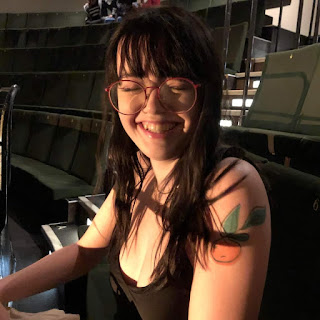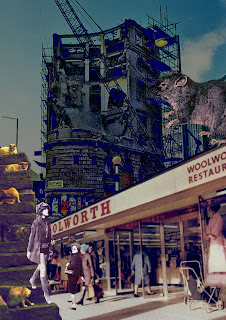By Anna O'Sullivan
Hello fellow creative writers! My name is Anna O’Sullivan and I’m a recent graduate from University of Leicester with a BA in English and MA in Modern and Contemporary Literature and Creative Writing with Distinction and recipient of the Waddington MA Prize – which is a bit of a mouthful! Since graduating, I work full-time at a college, with plans to travel for several months around Central and South America, starting in May. I aspire to build a career in the publishing industry later down the line.
As well as a passion for writing, I love arts and crafts. Recently, I created a Gavin and Stacey-themed Monopoly set, and that became my whole personality for the several months it took. Above all things, I love to read. My favourite genres include feminist, historical and dystopian fiction. I have recently joined "BookTok" and am enjoying speaking to people from around the world with a mutual love for books and similar tastes to me. It is welcoming and wholesome, and a great way to share your views and receive recommendations!
University of Leicester’s MA in Modern and Contemporary Literature was incredibly appealing to me, as it explores a range of literary forms and genres from a period of history that interests me and addresses relevant social and political issues. The books I studied on this module were thought-provoking and helped me to find my niche and shape an understanding of the subjects. The combination of this degree alongside modules from the Creative Writing MA, plus the opportunity to pursue a creative dissertation, was too good an opportunity to miss.
The Creative Writing Dissertation, weighted 70% for the creative piece and 30% for 3,000 words of a critical reflection, enables total freedom for writers to explore any forms they would like to. Initially, due to my interest in the genre, I had ideas of a dystopian short story that would cover the 12,000-word limit. Although I made in-depth plans for this, upon further reflection, more ideas began to trickle out and I found myself wanting to write a piece that felt much more meaningful.
"Meaningfulness" was the key to landing on my big idea. I chose to write a collection of short stories entitled Girls about three young women in the genre of post-feminist fiction. Each story was 4,000 words and followed the female protagonist in close third-person perspective as they encountered similar themes of love, desire and sex. The stories were dispersed across three decades (2000s, 2010s and 2020s) but covered similar challenges in contemporary workplace and university settings. The piece, whilst mostly completely fictional, contained aspects of similar experiences that my friends or I have had, and therefore leant slightly towards being autobiographical.
Whilst writing, if I hit a wall and found I had no idea how to proceed with the story, I read. The novels I know and love – the ones I would consume and think yes, I want to write something like this, they steered me onwards. Three Women by Lisa Taddeo, powerful but flawed in its own way, was a huge inspiration for my piece, as it takes readers on a journey through the lives of three real women and their relationship with sex and desire. I wanted to be a bit like Lisa Taddeo but comedic like Helen Fielding’s Bridget Jones’s Diary with flawed protagonists, like Ottessa’s Moshfegh’s My Year of Rest and Relaxation - my own take on my favourite aspects of these books. I took inspiration from the modules I had enjoyed during my degree. One in which I explored the relationship between work and identity led me down a path of interest in "work novels" and "bullshit jobs." And as meaningfulness wins over, I knew I wanted to write about women and their experiences at work and in other areas that they have historically been regarded as "second." Women. Work. Desire.
As I had read and consumed so much whilst writing the creative piece, this made the reflective commentary so much more manageable. I had the primary and secondary material at hand, and as I had picked a subject that I was interested in, I was able to discuss it in great detail. I believe a bit of fire in the belly helps steer the work along. I have a lot to say about false ideas surrounding female desire, or modern women in workplace settings, so I channelled my frustration into something creative. I wanted to create a narrative that would resonate with other women.
My greatest piece of advice, therefore, is to write about something meaningful, and something that piques your interest. The creative dissertation is all yours. It’s your vision. With the kind guidance of your supervisor, this piece of work can be shaped into whatever you want it to become. I highly recommend using this opportunity to create something that resonates with your own experiences, interests or values.
Below you can read three excerpts from the dissertation.
Maeve Taylor blows out the candles on her twenty-third birthday cake and wishes for the one thing she wants most in the world – to have sex with her boss.
To repeat the exact words as she says the wish to herself: to have dirty, steamy sex with Max Walters in his office, up against the locked door or on top of his desk, or anywhere he would prefer it really.
Of course, she couldn’t say this out loud. Her parents and grandma sit on stools on the opposite side of the counter, their faces all filled with glee and adoration, still seeing the sweet, virginal girl Maeve once was.
It’s lucky Maeve couldn’t say the wish out loud, because her grandma might have had a heart attack, and that would probably put an end to the party. Besides, it wouldn’t come true if she did.
Olive Newman screams. STOP IT. PLEASE STOP. I’M BEGGING YOU.
She screams but she can barely hear her own voice over the ringing in her ears. She is thrown to the ground suddenly. Her back smacks against the concrete. She lays there, motionless, staring up at the black, starless sky. Her breaths are shaky and uneven, her heart hammering against her ribcage.
She reaches her hand to touch the back of her head. When she brings it back to her eyeline, her hand is coated in dirt and mud. No blood.
Joanna Weatherford is left on the steps of her accommodation on a muggy September day in 2020. She watches wistfully as her parent’s car signals out of the carpark and drives away without turning back.
She gazes up at the tall, red brick building beside her. There’s something dingy and cold about it. As she walks through into her ground-floor flat, the pasty white walls and damp smell feels slightly akin to a prison. Her room is at the very end of the hallway, by the fire exit. The floor is covered entirely by various bags and boxes of her possessions. Everything she has collected over the last eighteen years folded and shoved into suitcases.


















